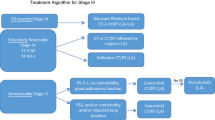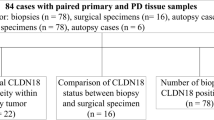Abstract
The expression of P-glycoprotein in 159 non-small cell lung cancers was immunohistochemically examined using a monoclonal antibody (MoAb C219). A total of 93 (60%) cancers were found to be positive for P-glycoprotein. The 5-year survival rates of patients with P-glycoprotein (P-gp+) and those without P-glycoprotein (P-gp−) were 47.6% and 73.6%, respectively (P<0.05). According to a univariate analysis, P-gp+ was associated with a poor prognosis for males, those with stage I cancer, those who underwent complete resection, and those with adenocarcinoma or squamous cell carcinoma. A multivariate study using the Cox regression analysis indicated that the expression of P-glycoprotein is useful for predicting the prognosis. Among 24 patients who underwent complete resection and postoperative adjuvant chemotherapy, 18 were P-gp+ and the remaining 6 were P-gp−. Of the 18 with P-gp+ cancer, 11 relapsed and 9 died from tumor-related causes, while the other 7 remain free from tumor recurrence; however, all with P-gp− cancer are alive without recurrence. These observations suggest a bias toward a shorter survival for patients with P-gp+ cancer because P-glycoprotein may be associated with chemoresistance. Thus, detection of the expression of P-glycoprotein will aid in planning appropriate adjuvant chemotherapy for patients with non-small cell lung cancer.
Similar content being viewed by others
References
Ministry of Health and Welfare (1995) Vital statistics of Japan 1993, vol. 3. Ministry of Health and Welfare, Japan
Ishida T, Yokoyama H, Kaneko S, Sugio K, Sugimachi K (1990) Long-term results of operation for non-small cell lung cancer in the elderly. Ann Thorac Surg 50:919–922
Ishida T, Yano T, Maeda K, Kaneko K, Tateishi M, Sugimachi K (1990) Strategy for lymphadenectomy in lung cancer; three centimeters or less in diameter. Ann Thorac Surg 50:708–713
Tsubota N, Yoshimura M (1996) Skip metastasis and hidden N2 disease in lung cancer: how successful is mediastinal dissection? Surg Today 26:169–172
Mountain C (1986) A new international staging system for lung cancer. Chest 89 (Suppl.):225s-233s
Homes EC, Hill LD, Gail M (1985) A randomized comparison of the effect of adjuvant therapy on resected stage II and stage III non-small cell carcinoma of the lung. The Lung Cancer Study Group. Ann Surg 202:335–341
Shields TW, Hoggins GA, Humphrey EW, Matthews MJ, Keehn RJ (1982) Prolonged intermittent adjuvant chemotherapy with CCNU and hydroxyurea after resection of carcinoma of the lung. Cancer 50:1713–1721
Hara N, Ohta M, Ichinose Y, Motohiro A, Ishida T, Noge S, Miyake J (1985) Surgical adjuvant chemotherapy for lung cancer. In: Ishigami J (ed) Recent advances in chemotherapy: proceedings of the 14th International Congress on Chemotherapy University of Tokyo Press, Tokyo, pp 155–157
Gros P, Neriah YB, Croop JM, Housman DE (1986) Isolation and expression of a complementary DNA that confers multidrug resistance. Nature 323:728–731
Chen CJ, Chin JE, Veda K, Clark DP, Pastan I, Gottesman MM, Roninson IB (1986) Internal duplication and homology with bacterial transport proteins in the mdrl (P-glycoprotein) gene from multidrug-resistant human cells. Cell 47:381–389
Licht T, Pastan I, Gottesman M, Hermann F (1994) P-glycoprotein-mediated multidrug resistance in normal and neoplastic hematopoietic cells. Ann Hematol 69:159–171
Ling V (1995) P-glycoprotein; its role in drug resistance. Am J Med 99 (Suppl):31S-34S
World Health Organization (1982) Histological typing of lung tumors (WHO), edn 2. Am J Clin Pathol 77:123–136
Grogan T, Dalton W, Rybski J, Spier C, Meltzer P, Richter L, Gleason M, Pindur J, Cline A, Scheper R, Tsuruo T, Salmon S (1990) Optimization of immunocytochemical P-glycoprotein assessment in multidrug-resistant plasma cell myeloma using three antibodies. Lab Invest 63:815–824
Giorno R (1984) A comparison of two immunoperoxidase staining methods based on the avidin-biotin interaction. Diagn Immunol 2:161–166
Dixon WJ (ed) (1988) BMDP statistical software. University of California Press, Berkeley, B34, pp 187–220
Kaplan EL, Meier P (1965) Non-parametric estimation from incomplete observation. J Am Stat Assoc 53:203–224
Petp R, Pike MC, Armitage P, Brestlow NE, Cox, DR, Howard SV, Mantel N, McPherson K, Peto J, Smith PG (1977) Design and analysis of randomized clinical trials requiring prolonged observation of each patient: II. Analysis and examples. Br J Cancer 35:1–39
Cox DR (1972) Regression models and life tables. J R Stat Soc B 34:187–220
Gottesman MM, Pastan I, Ambudkar SV (1996) P-glycoprotein and multidrug resistance. Curr Opin Genet Dev 6:610–617
Bosch I, Croop MJ (1996) P-glycoprotein multidrug resistance and cancer. Biochim Biophys Acta 1288:F37-F54
Sugawara I, Kataoka I, Morishita Y, Hamada H, Tsuruo T, Itoyama S, Mori S (1988) Tissue distribution of P-glycoprotein encoded by a multidrug-resistant gene as revealed by a monoclonal antibody, MRK16. Cancer
Sugawara I (1990) Expression and functions of P-glycoprotein (mdrl gene product) in normal and malignant tissues. Acta Pathol Jpn 40:545–553
Mizoguchi T, Yamada K, Furukawa T, Hidaka K, Hisatsugu T, Shimazu H, Tsuruo T, Sumizawa T, Akiyama S (1990) Expression of the MDR1 gene in human gastric and colorectal carcinomas. J Natl Cancer Inst 82:1679–1683
Verrelle P, Meissonnier F, Fonck Y, Feillel V, Dionet C, Kwaitkowski F, Plagne R, Chassagne J (1991) Clinical relevance of immunohistochemical detection of multidrug resistance P-glycoprotein in breast carcinoma. J Natl Cancer Inst 83:111–116
Scotto KW, Bielder JL, Melera PW (1986) Amplification and expression of genes associated with multidrug resistance in mammalian cells. Science 232:751–755
Bell DR, Gerlach JH, Kartner N, Buick RN, Ling V (1985) Detection of P-glycoprotein in ovarian cancer: a molecular marker associated with multidrug resistance J Clin Oncol 3:311–315
Rutledge M, Robey-Cafferty S, Silva E, Bruner J (1989) Monoclonal antibody (C219) detection of the multidrug resistant protein (P-glycoprotein) in routinely processed tissues: a study of 36 cases of ovarian carcinoma. Lab Invest 60:80A
Chan HS, Haddad G, Thorner PS, Deboer G, Lin YP, Ondrusek N, Yeger H, Ling V (1991) P-glycoprotein expression as a predictor of the outcome of therapy for neuroblastoma. N Engl J Med 325:1608–1614
Dalton WS (1993) Drug resistance modulation in the laboratory and the clinic. Semin Oncol 20:64–69
Wishart GC, Plumb JA, Going JJ, McNicol AM, McArdle CS, Tsuruo T, Kaye SB (1990) P-glycoprotein expression in primary breast cancer detected by immunocytochemistry with two monoclonal antibodies. Br J Cancer 62:758–761
Chen HSL, Haddad G, Thorner PS, DeBoer G, Lin YP, Ondrusek N, Yeger H, Ling V (1991) P-glycoprotein expression as a predictor of the outcome of therapy for neuroblstoma. N Engl J Med 325:1608–1614
Author information
Authors and Affiliations
Additional information
This work was supported in part by a Grant-in-Aid for General scientific Research (No. 03670659) from the Ministry of Education, Science and Culture of Japan.
Rights and permissions
About this article
Cite this article
Yokoyama, H., Ishida, T., Sugio, K. et al. Immunohistochemical evidence that P-glycoprotein in non-small cell lung cancers is associated with shorter survival. Surg Today 29, 1141–1147 (1999). https://doi.org/10.1007/BF02482262
Received:
Accepted:
Issue Date:
DOI: https://doi.org/10.1007/BF02482262




